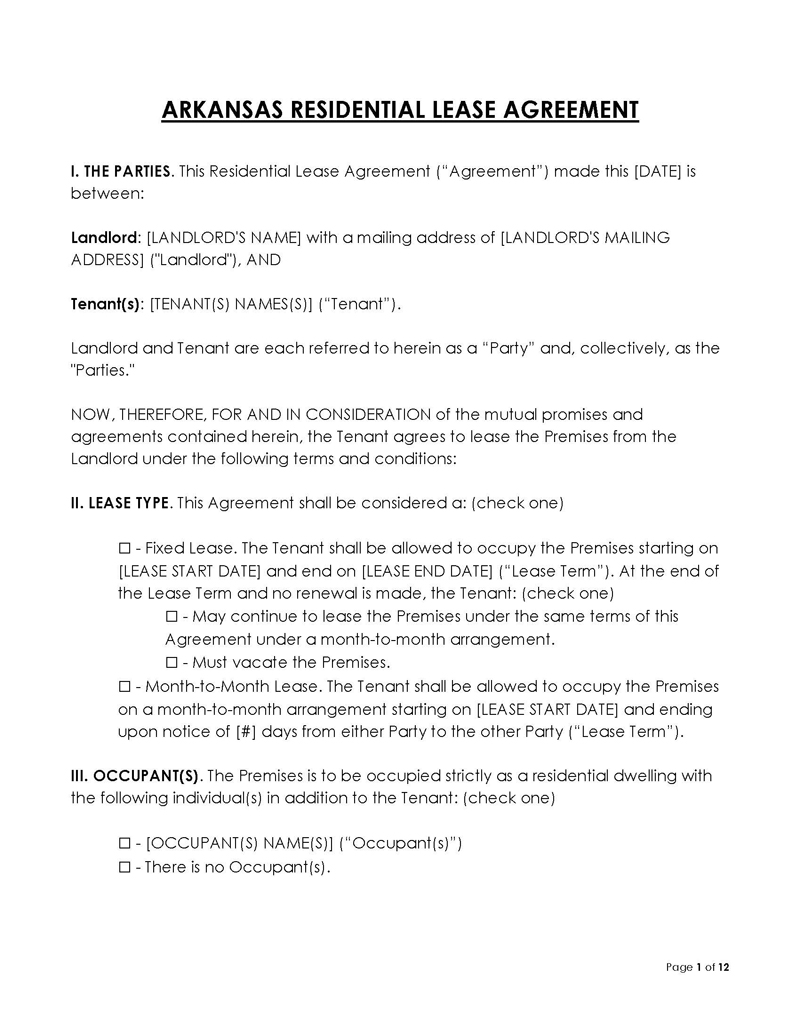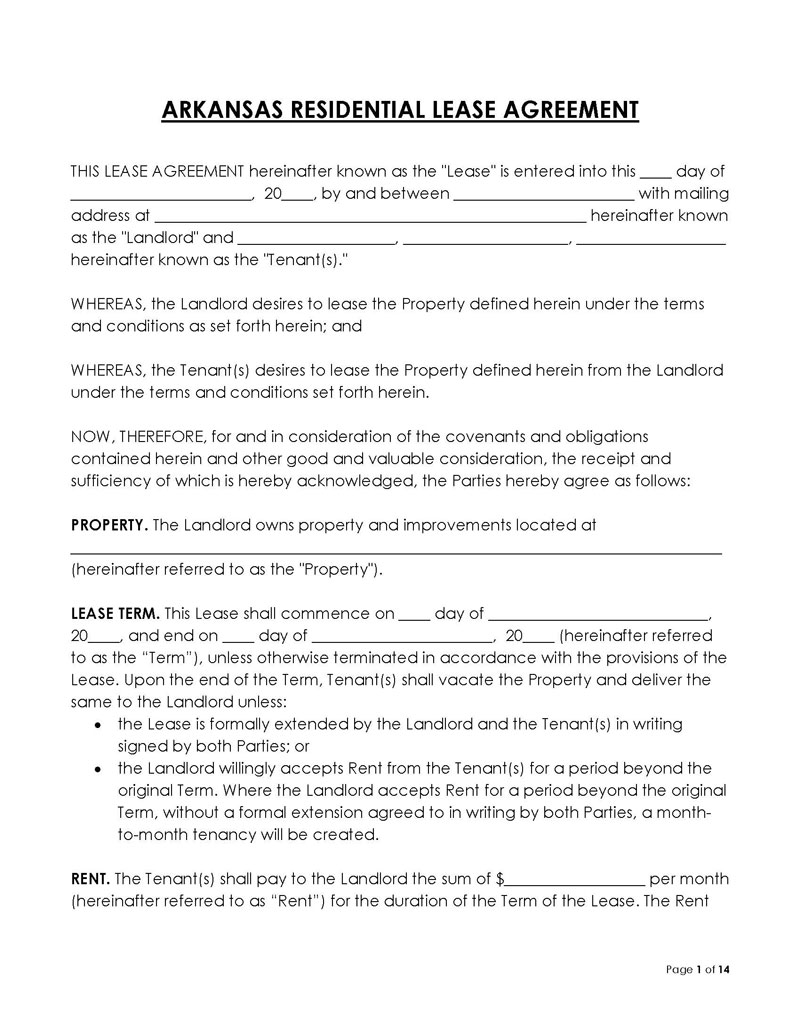For landlords and tenants in Arkansas State, there is a legal and official way of establishing a beneficial relationship that is valid before the law. As a landlord, it is vital to create a lease agreement in Arkansas when you want to rent out your property to a prospective tenant who will pay rent for the rental unit. Then, as the tenant, you will be able to have a rental space to use for either residential or commercial purposes while upholding the agreed-upon terms and conditions.
In this article, both landlords and tenants will learn more about a lease agreement, how to prepare it in Arkansas, what details should be contained, and the different types of these agreements.
Arkansas Lease Agreement
A lease agreement in Arkansas is a contract between a landlord and a tenant where the landlord rents out their property to the tenant who pays rent. This contract is only drafted once the interested tenant has held discussions with the landlord. Once the terms and conditions have been decided, the landlord can prepare the rental agreement for signing.
Once this document is signed, Arkansas State views these two parties as being in a legally binding contract. Therefore, the landlord needs to screen the tenant by asking for a rental application before signing the lease agreement. The security deposit and first month’s rent will be required before the tenant can move in.
Lease Agreement Types
In Arkansas, there are different types of lease agreements that you can prepare depending on your situation as a landlord. Ensure that you observe the laws that govern each agreement and follow the stated rules when preparing one.
Commercial lease agreement
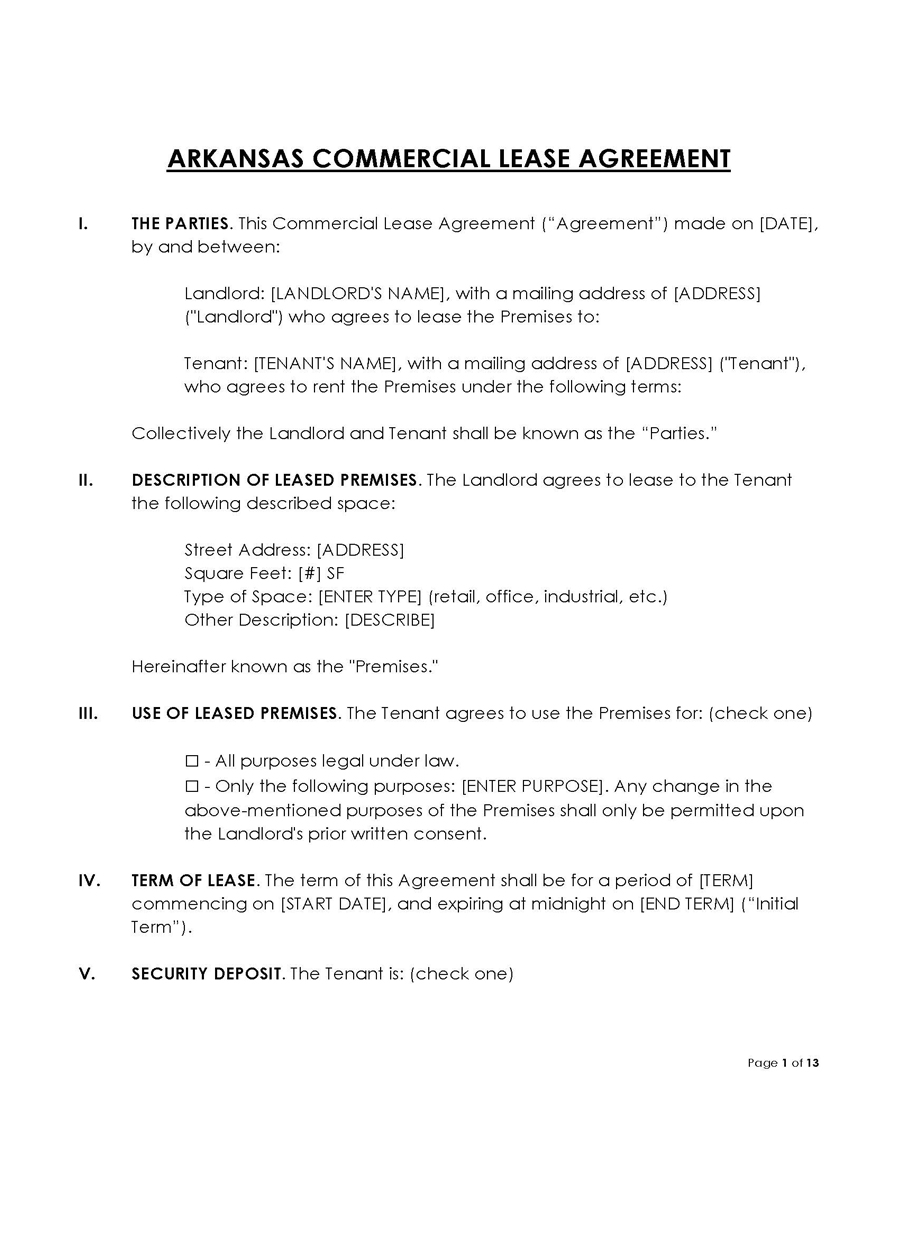
A commercial lease agreement in Arkansas is a contract prepared between a landlord and a tenant with terms and conditions about a rental property meant for business. Both parties must sign this document which usually highlights the duration of the contract, the amount of rent, the security deposit required, and even the late fees for delayed rent. Examples of commercial spaces include retail, restaurants, office space, and industrial buildings. Therefore, you must observe the § 18-17-912: Arkansas Code laws when preparing this lease agreement in Arkansas State. Also, it is crucial to have your commercial rental agreement reviewed by an attorney before either party signs the document.t.
Month-to-month lease agreement
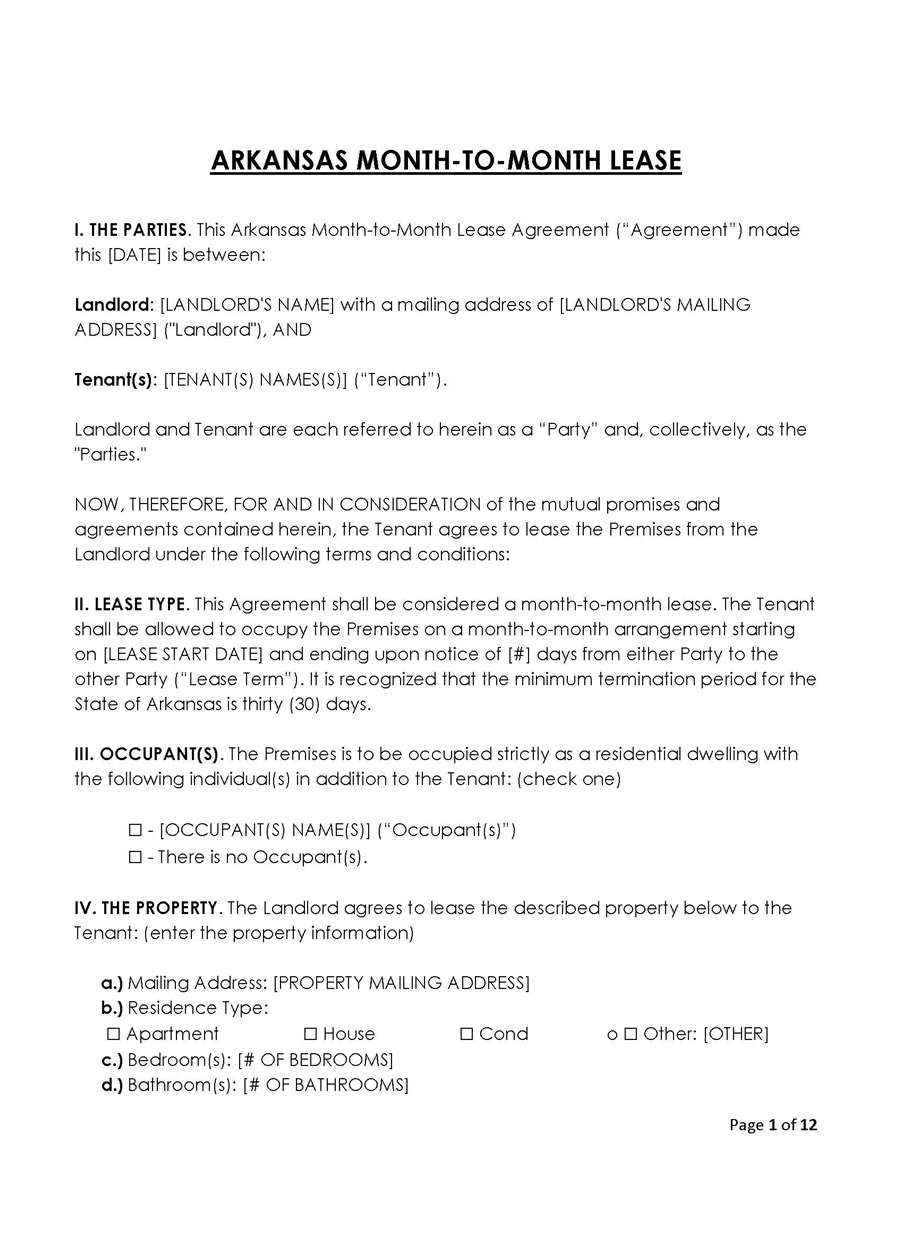
This document is prepared in Arkansas between a landlord and a tenant with an agreement of monthly rent. This contract usually has no end date and requires a security deposit and a first month’s rent but can be terminated by either party with a 30-day notice. Also, this month-to-month lease agreement requires a 30-day notice for any changes to be made. Changes required include rent increase, additional fees, or utility charges. The § 18-17-704 laws must be observed when preparing and signing this rental agreement.
Rent-to-own lease agreement
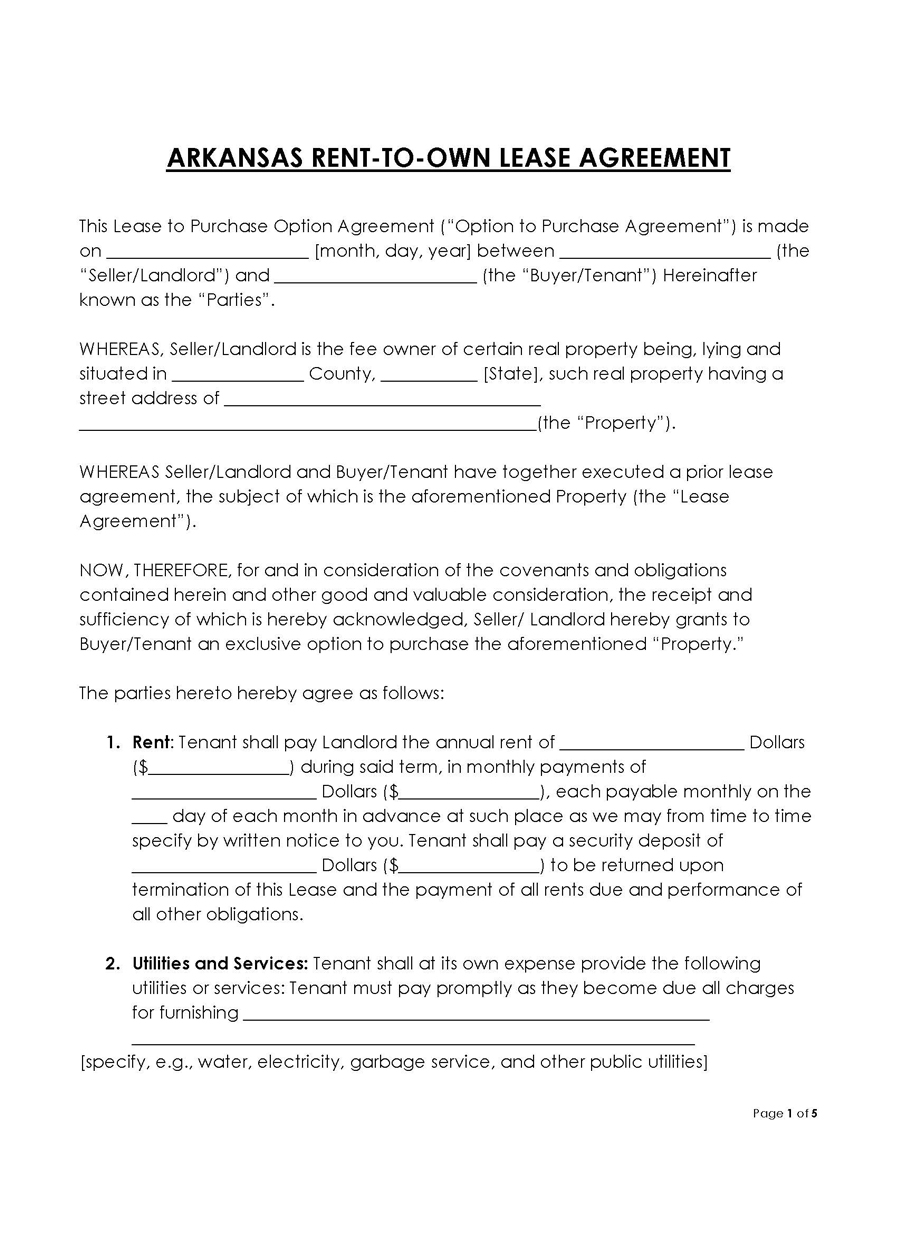
The rent-to-own lease agreement is a contract that can be prepared between Arkansas landlords and tenants with the option of buying the rental property. According to Arkansas State laws, this rental agreement allows the tenant to purchase the rental property from the landlord. If the purchase happens, the tenant must prepare a certified letter to inform the landlord of their decision. However, tenants must keep in mind that the purchase option is no longer valid once the lease period expires.
Roommate lease agreement
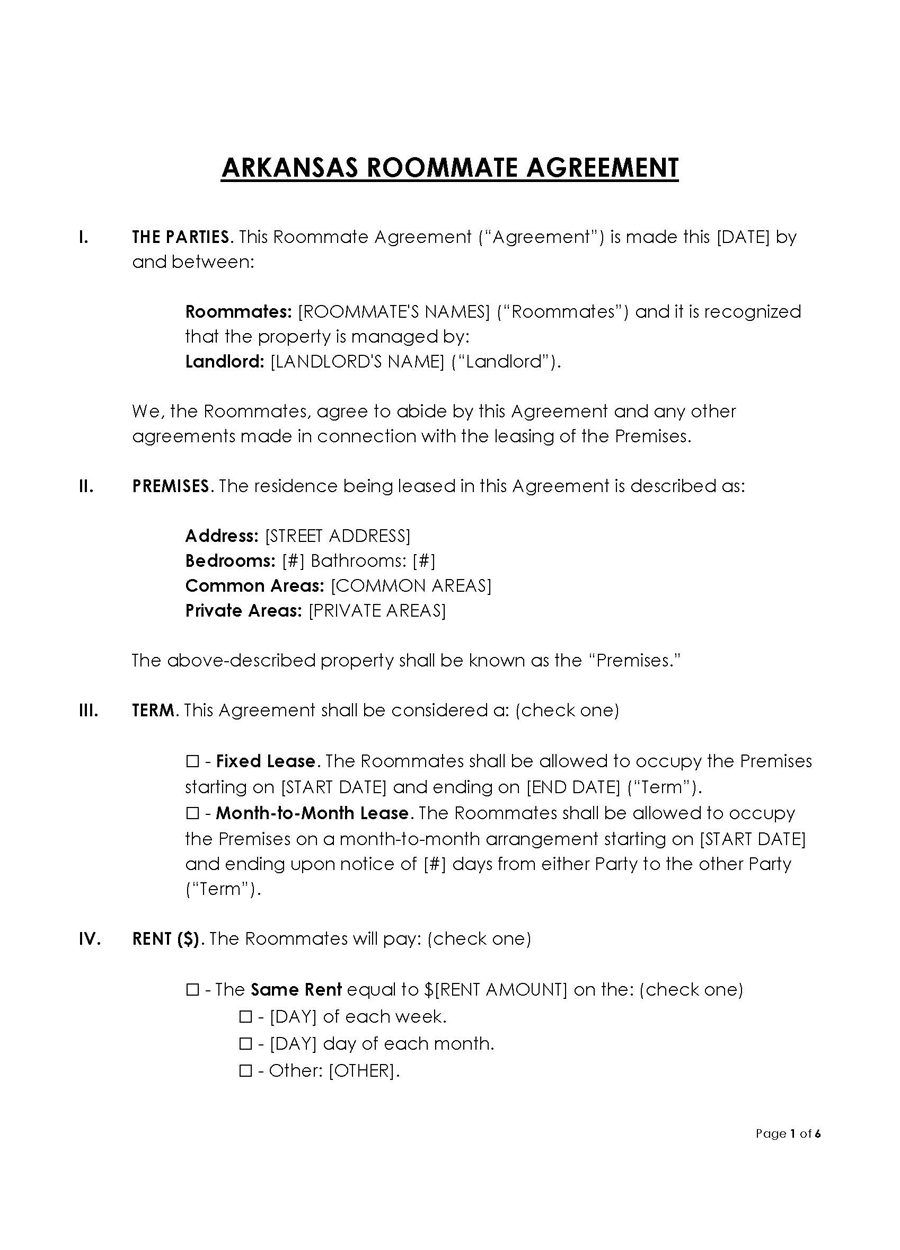
It is a rental document prepared between roommates as a form of security for the roommate who is not on the original lease. This agreement highlights the terms and conditions of the responsibilities and duties of roommates sharing a rental space. This way, the roommate not on the original contract can share the benefits of residing in that property.
Standard lease agreement
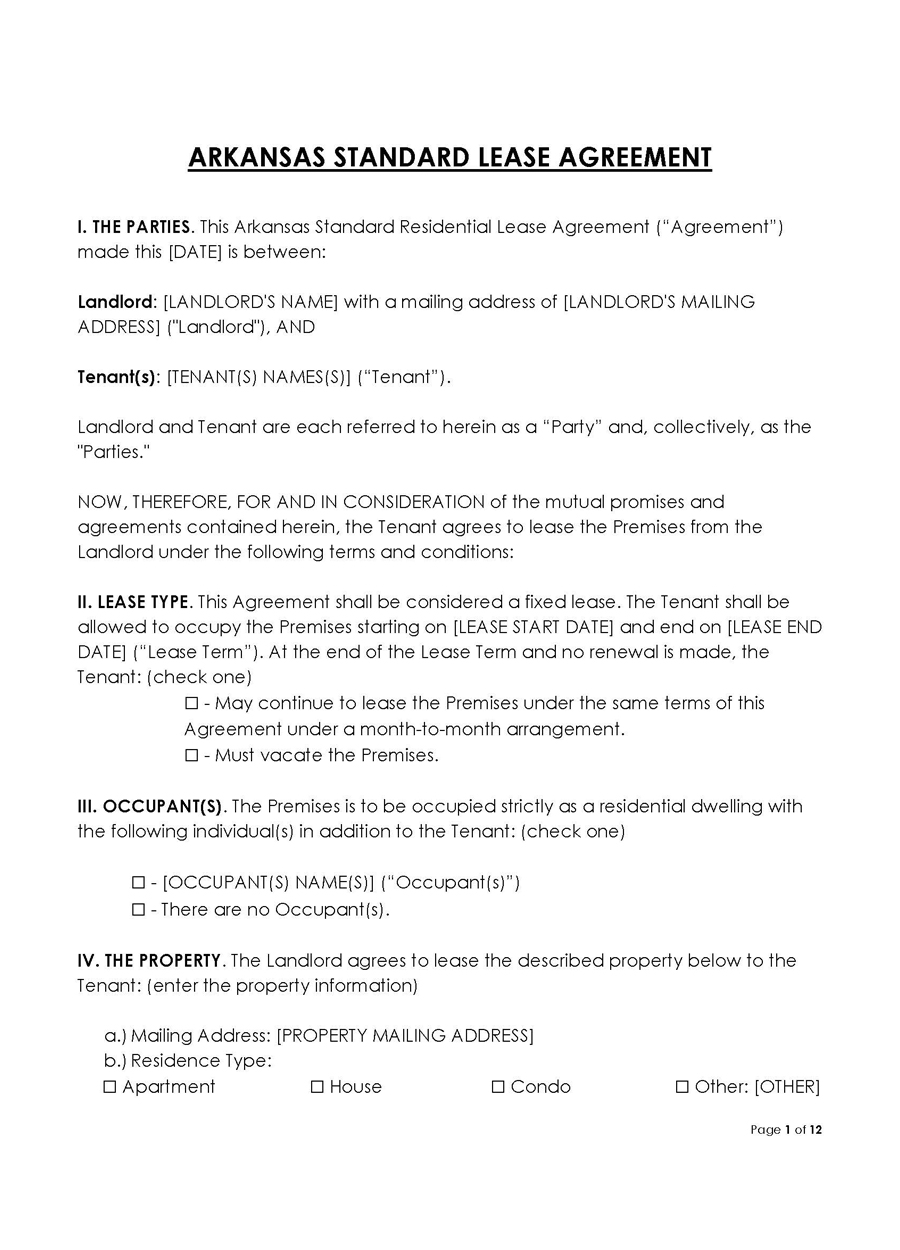
It is a legal contract that enables a landlord and tenant to enter an agreement where the tenant will occupy the rental property while the landlord receives monthly rent. This contract outlines the agreed-upon terms and conditions between the landlord and the tenant. It must include the roles and responsibilities of both parties, and once signed, the parties will be obligated to fulfil all the requirements. Therefore, Title 18, Subtitle 2, Chapter 16 (Landlord and Tenant) laws must be observed when preparing this agreement.
Sublease agreement
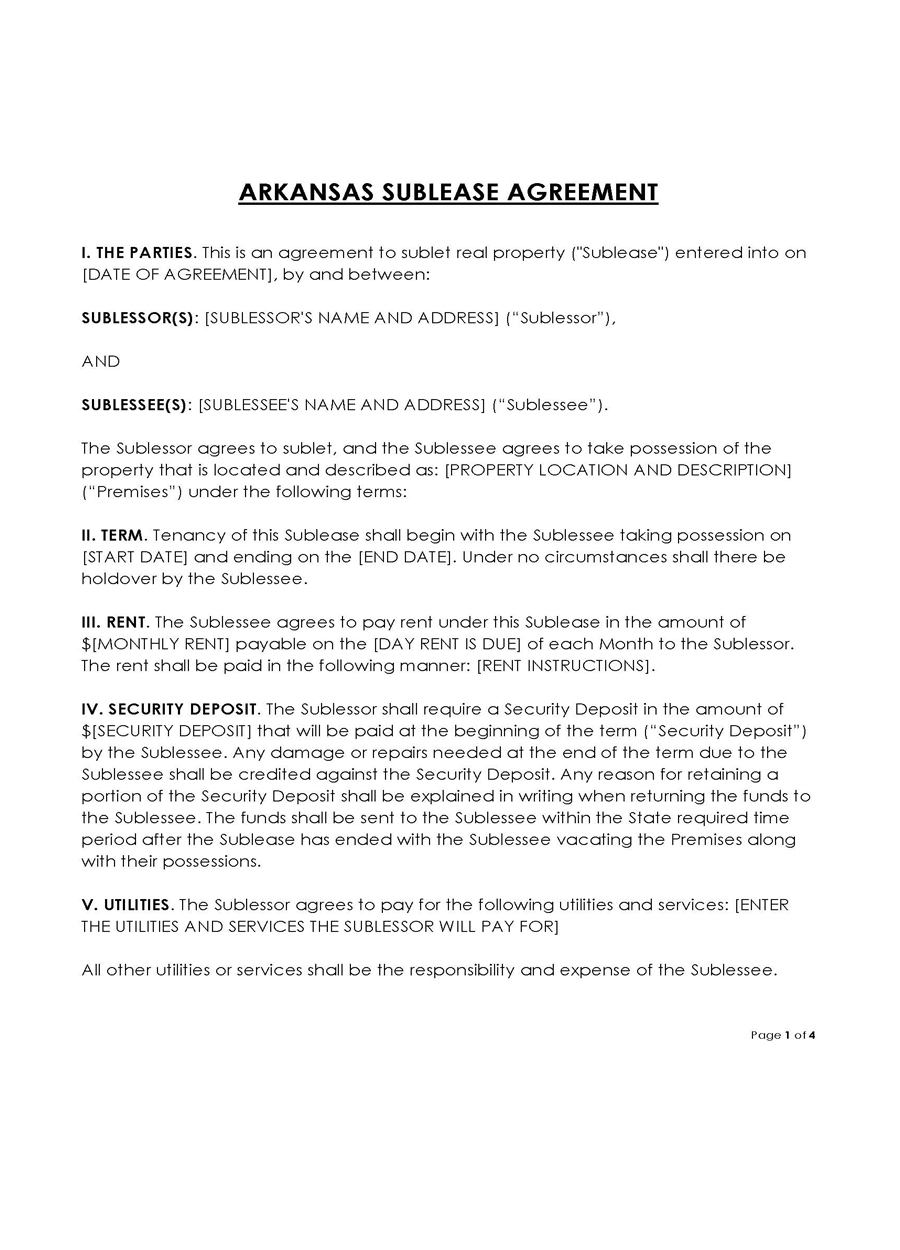
A sublease agreement in Arkansas is a document that contains an agreement between the current tenant (sub-lessor) and the sub-lessee of a rental property. The landlord must be informed of this agreement and offer consent before the sub-lessor can sublet the rental unit. In this contract, the sub-lessee (new tenant) will be able to reside in the rental property while observing the agreed-upon terms and conditions. However, the sub-lessor remains liable to the original lease agreement made with the landlord. Therefore, this agreement is acceptable before the Arkansas courts compared to a verbal living agreement.
Arkansas Lease Agreement Disclosures
To avoid future legal and tenant conflicts, there are some disclosures that an Arkansas landlord must include in the lease agreement.
The different lease agreement disclosures in Arkansas are as follows:
Lead-based paint
In Arkansas State, the lead-based paint disclosure is required in any lease agreement prepared for rental units built before 1978. In addition, it is a federal law requirement for landlords to inform the tenant of the presence of lead-based paint by filling out and attaching a lead-based paint disclosure form. The landlord must also explain the dangers of lead-based paints by providing them with an approved Environmental Protection Agency (EPA) pamphlet.
Landlord name and address
The landlord’s name and contact information must also be included in the agreement. This is meant to ensure that the two parties can easily communicate if there is a need to send notices and demands. A landlord can include their mailing address and email address for the contact information.
Medical marijuana use
For rental units in Arkansas, landlords are advised to indicate where medical marijuana use is allowed and where it is restricted within their rental property in their lease agreement. In addition, they need to inform tenants about the sections of the property where tenants can use marijuana without bothering other tenants. Also, landlords can specify if these tenants can only use the non-smoking methods when using medical marijuana.
Late and returned check fees
Another essential disclosure included is the late and returned check fees. You need to inform your tenant of any late fees they will be required to pay for late rent payments and bounced checks. The fees can be as high as you choose, but it is advisable to make it 10% of the rent in case of late rent payment. Then, you can calculate the expenses you incurred due to that occurrence and calculate the required fees for bounced checks. It is essential to include a due date in the rental agreement to ensure your tenants are aware and can avoid late payment.
Utility arrangements
This disclosure is mainly included in a rental agreement for rental units with shared utility arrangements such as shared meters. The landlord must specify how the utilities are shared, how each tenant’s utility bill was calculated, and the expected monthly utility bill to be paid.
Bed bug disclosure
Rental units in Arkansas with a history of bed bug infestation must disclose this information in the lease agreement. This information is meant to guide tenants on what to do when dealing with a bed bug infestation. You will need to inform them how and where to report a bed bug infestation and what they can do to prevent it.
Asbestos disclosure
All rental properties in Arkansas built before 1981 must include an asbestos disclosure in their agreement. Landlords must inform tenants of the presence of asbestos, list the risks and hazards caused by this building material, and state what they can do to reduce the effects of asbestos. In addition, the tenants will be informed on how to notify the landlord in case of ceiling deterioration. They will also be banned from sanding, pounding, modifications, or repairs without the landlord’s consent.
Mold disclosure
For the mold disclosure, Arkansas landlords must inform their tenants of the mold status of the rental property in the lease agreement. This is meant to protect them from any liability for mold damages in the future based on negligence by a tenant.
Elements to Include in Arkansas Lease Agreement
Specific elements must be included in the lease agreement to ensure that the contract is complete and legal before the law and the courts.
Here are the elements you need to ensure in your rental agreement when preparing one:
Names of the parties
The name of the landlord or property manager and the tenant(s) should be included in the lease agreement in Arkansas. This section is meant to identify the parties involved in the rental agreement.
The property address
The complete address of the rental property should also be included. This should include the city, zip code, county, and, if applicable, unit or lot number.
Term information
The term information includes details about the lease agreement the landlord and the tenant have. This term information can either be a fixed-term lease or a flexible lease. Whatever the case, you need to specify these details to ensure other terms and conditions are appropriately indicated.
Rental amount
The rental amount is the monthly rent that the tenant must pay. This section should include the beginning date of the lease, the monthly rent amount, the rent due date, and the address for rent payment.
Late fees
Ensure that any applicable late fees are listed, especially late rent payments. It is also essential to include the rent due date to help tenants avoid paying the late fee.
Security deposit
The security deposit should be well included in the agreement. It is the amount to be paid in advance as a show of seriousness by the tenant about renting the space. It enables the tenant to take control of the rental unit and can also be used to repair any damages caused by the tenant.
Initial payment
The initial payment is the total of the first month’s rent and the security deposit that a tenant must pay before moving into the rental property.
Occupants
Each tenant’s legal and full name residing in the rental property must be listed. This includes the tenant on the lease, the tenant not on the list, and even tenants who are minors. In addition, the state of Arkansas requires that they can identify who resides in a particular residential property.
In the case of commercial rental spaces, a list of occupants helps establish the pricing of the unit or property and identify the tenant who has permission to use the space.
Utilities
This section notes which utilities or services a tenant does not pay when using the rental space.
Parking
A tenant needs to be aware if they will receive a parking space or not. If a parking space comes with the rental unit, the tenant should know whether the designated spot is reserved.
Furnishings
The landlord can inform the tenant of the acceptable machines and appliances installed in the rental unit for this element. This section should also inform tenants of the specific appliances they can bring.
Notices
This section should include the landlord and tenant’s names and contact information, such as their addresses. These details are required to provide a proper communication channel between a landlord and a tenant for sending out notices.
Eviction
For the eviction section, you need to inform your tenant about the reasons that may lead to an eviction, such as failure to make payment and a breach of the contract. You should also explain to them how the eviction process will happen.
Additional terms
In case there are extra obligations that the landlord and the tenant have agreed upon and are not in any of the other sections, this is where you should list those extra terms.
Signature and date
The document should be signed and dated by all involved parties.
Landlord and Tenant Laws
Here are some critical landlord and tenant laws for preparing a lease agreement in Arkansas:
Relevant laws
The relevant laws that must be observed when preparing a lease agreement in Arkansas are the Code of Arkansas Title 18, Subtitle 2.
Security deposit
For the security deposit, landlords are allowed to charge up to two months’ rent as the security deposit unless they have less than five rental units, according to § 18-16-304 and § 18-16-303 laws. Also, landlords are expected to return the security deposit once the lease has ended. According to the § 18-16-305 laws, the security deposit must be returned within 60 days of the lease’s end date.
Access
In Arkansas State, landlords do not need to provide any notice to access their rental property. However, they should inform their tenants before entering the rented units.
Rent due
In Arkansas, the § 18-17-401(b)(1) law allows landlords to include the information about rent due in the lease agreement. This means that the landlord must inform the tenant when and where they are expected to pay rent for them not to be considered late.
Late fees
If a tenant has delayed paying rent, they will be expected to pay the late fees indicated in the agreement. However, no State law or statute in Arkansas limits the number of late fees a landlord can charge their tenant.
Arkansas Lease Agreement Templates
Bottom Line
In Arkansas State, preparing a lease agreement is a requirement for landlords if they want to enter into legally binding contracts that will benefit both them and the tenants. A standard lease agreement in Arkansas State has a maximum rental period of one year. However, you can choose to extend this lease period by including the information in your rental contract. In addition, landlords need to screen their tenants since it becomes binding and enforceable before the law once the agreement is signed.
Lease agreements in Arkansas do not need to be notarized. However, to be legal, they need to include all the required elements and disclosures alongside being signed by the involved parties. Keep in mind that these agreements usually renew automatically unless the tenant or landlord terminates the contract or breaches the terms and conditions. Use our Arkansas lease agreement samples to understand how to prepare a proper rental agreement.
